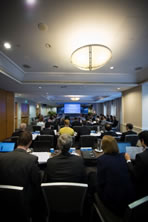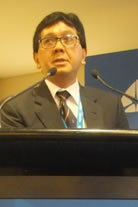Meeting Summary of the 15th FNCA Ministerial Meeting
The 15th FNCA Ministerial Level Meeting (MM), which was organized by The Australian Nuclear Science and Technology Organisation (ANSTO), Japan Atomic Energy Commission (JAEC) and the Cabinet Office of Japan (CAO), was held at Sydney Harbour Marriott Hotel at Circular Quay, Sydney, Australia, on November 19, 2014.
The meeting was attended by ministerial level representatives (including 2 ministers and 2 vice ministers) from twelve member countries i.e., the Commonwealth of Australia, the People's Republic of Bangladesh, the People's Republic of China, the Republic of Indonesia, Japan, the Republic of Kazakhstan, the Republic of Korea, Malaysia, Mongolia, the Republic of the Philippines, the Kingdom of Thailand, and the Socialist Republic of Viet Nam.
(Program)(Participants List)
The Hon. Mr. Ian MACFARLANE, Minister for Industry, Australia, and Mr. Nobuyasu ABE, Vice Chairman, JAEC, served as the co-chairs of the meeting.
The Hon. Mr. MACFARLANE made opening and welcoming remarks. He expressed Australia's stance to continuously prioritise the safe, secure and peaceful development of nuclear technology in the region, although Australia currently has no plan to introduce nuclear power to its energy mix. He expected that the discussion on the meeting would help member countries to further mutual cooperation in the field of nuclear energy, with the recognition to significant results achieved through FNCA projects. He mentioned benefits of Australia's nuclear programmes in the field of medicine, industry, science and technology, and showed Australia's intent to expand its contribution to the development of advanced nuclear technologies including Generation Four reactors.
The Hon. Mr. Shunichi YAMAGUCHI, Minister of State for Science and Technology Policy, CAO, made his address in video message, since he was absent from the meeting. He expressed his gratitude to Australia for hosting the meeting, and recognized FNCA's contribution to the region and its steady results. He also mentioned timeliness of the roundtable discussion on research reactors of FNCA which could contribute to stable supply of RI for medicine.

The Hon. Mr Shunichi YAMAGUCHI
Minister of State for Science and Technology Policy, CAO |

The Hon. Mr Ian MacFARLANE
Minister for Industry |

Mr Nobuyasu ABE
Vice Chairman, Japan Atomic Energy Commission (JAEC) |
Then Mr. ABE delivered his address as a co-chair. He appreciated Australia's hosting the meeting. While he expressed his expectation to economic benefits of nuclear energy, he mentioned the importance of safety, security and non-proliferation.
This was followed by self-introduction of the Heads of the Delegations, as well as Agenda review, which was adopted without amendment. Then, Dr. Adi PATERSON, chair of the Senior Officials Meeting (SOM), introduced the report of SOM.
In Session 2, each of 12 participating countries delivered their Country Report, focusing on national nuclear energy policy and action plan and expectations for FNCA.
Stance on nuclear power generation differs among member countries. Australia has no plan to introduce nuclear power to its energy mix, while recognizing some other member countries have chosen to do so. China and Korea have plans to expand nuclear power generation, developing advanced technology including fuel cycle system and small modular reactor. Bangladesh and Vietnam are materializing their plans to construct their first NPP. Japan reported the new strategic energy plan where good balance of 3E+S(energy security, economic efficiency, environment and safety) is the fundamental policy to pursue. Other member countries keep studying and considering nuclear power as an option for future power source. Common belief among all member countries is to prioritise safety and security.
Member countries actively make use of nuclear science and technology in the fields of medicine (therapy of cancer, nuclear medicine diagnosis, RI production), radiation processing of natural polymers, mutation breeding, and radioactive tracer technology, etc.
The following were raised as the topics to be enhanced or covered by FNCA in the future.
・Human resources development and capacity building for NPP, research reactor,
nuclear science and technology
・Public information, education and communication to achieve public acceptance
・Strengthening regulatory body
・Technical Support Organization (TSO)
In Session 3 on "Reports of the FNCA Activities", Dr. Sueo MACHI, FNCA Coordinator of Japan, reported the current project activities including tangible outcomes and future plan of FNCA projects, as well as Conclusions and Recommendations adopted at the 15th FNCA Coordinators Meeting (March 11-12, 2014).

Dr Sueo MACHI
FNCA Coordinator of Japan |

A Scene of the Meeting |
Then Mr. ABE reported the results of the "6th Study Panel on Infrastructure Development for Nuclear Power" held in Hanoi on August 26-27, 2014. He proposed that FNCA start the 4th phase of the Study Panel, titled "Study Panel on Policy and Technology to Promote Nuclear Energy for Sustainable Development". It would cover policy of nuclear energy development including nuclear power as well as applications and technical challenges to materialize policies, and be held back to back with Coordinators Meeting.
In Session 4, four persons gave presentations to a Round Table Discussion on "Strategy for Application of Multi-Purpose Research Reactor". Dr. Greg STORR, Group Executive for Nuclear Science and Technology of ANSTO, introduced ANSTO's experience in the design, construction, commissioning and operation of the OPAL research reactor, in the light of IAEA Technical Report "Specific Considerations and Milestones for a Research Reactor Project". He presented "scope (applications), schedule, cost and quality" as key learnings in introduction of a new research reactor. Mr. Atsuo KISHI from Japan Atomic Energy Agency (JAEA) introduced current status of neutron utilization at Japanese research reactor JRR-3. Next, Prof. Dr. Djarot Sulistio WISNUBROTO, Chairman of National Nuclear Energy Agency of Indonesia (BATAN) outlined utilization of G. A. Siwabessy reactor, such as neutron activation analysis, gemstone coloration, RI production and training and education. Dr. MACHI encouraged the establishment of a regional network for production and stable supply of Mo-99, and to share information on design and application of research reactors among member countries. Discussions following the presentations noted the importance of education and training both in terms of developing reactor operating expertise and building user communities, particularly in the neutron scattering space. The great variety of potential applications of research reactors was emphasized, as were the importance of regional collaboration and the desirability of sharing access to regional facilities in areas such as neutron activation analysis and neutron scattering science. There was strong interest in the further development of regional neutron schools.

Dr Greg STORR
Group Executive, ANSTO |

Prof. Dr Djarot Sulistio WISNUBROTO
Chairman, BATAN |
In Session 5, a draft resolution of the 15th FNCA Ministerial Level Meeting was presented to the participants, and it was agreed after some modifications. (Resolution)
In Session 6 for closing, Japan proposed hosting the 16th FNCA Ministerial Level Meeting. The meeting accepted the proposal. The meeting was officially closed with closing remarks of Ms. Nadia LEVIN, General Manager, Government International and External Relations, ANSTO and Mr. ABE.
|
